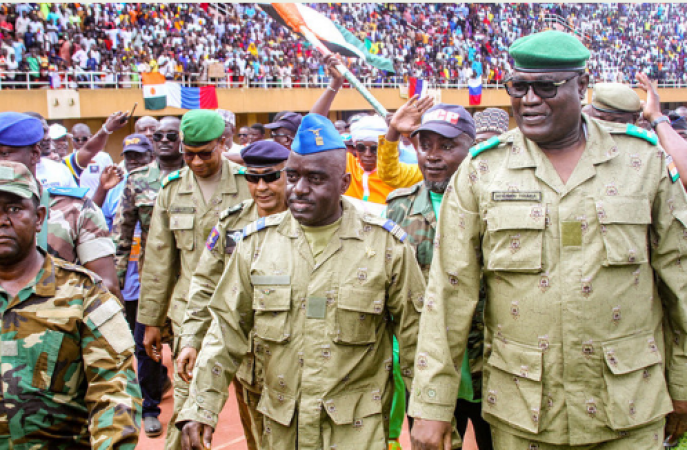
Niamey: A day after declaring they would form a "standby" force in an effort to restore Niger's ousted president, West African nations on Friday called off a crucial military meeting on the country's crisis.
Concerns grew for elected president Mohamed Bazoum, who was overthrown on July 26 by members of his guard, as it was claimed that his detention circumstances were getting worse.
According to local military sources, chiefs of staff from ECOWAS member states in West Africa were scheduled to attend a meeting on Saturday in Accra, the capital of Ghana.
Also Read: Zuma's Whirlwind: Former South African President Arrested and Released Within 2 Hours
Later on, however, they claimed that it had been put on indefinite hold for "technical reasons."
The meeting was initially planned, according to the sources, to provide the organization's leaders with information on "the best options" for activating and deploying the standby force.
The leaders of ECOWAS have emphasised that they still prefer a peaceful resolution but have not yet provided information about the force or a timeline for action.
The last-minute cancellation occurred on Friday as tens of thousands of pro-coup demonstrators gathered close to a French military base in Niger.
Meanwhile, US Secretary of State Antony Blinken expressed regret that the military authorities in Niger have rejected a proposed goodwill gesture to release the president's family.
Blinken "expressed his grave concern at the continued unlawful detention under deteriorating conditions of President Bazoum and his family" in a phone call with Bazoum's former Western ally, Niger's former president Mahamadou Issoufou.
Also Read: 25 Years in the Making: UN Wraps Up Mission in DR Congo, Entering Final Phase of Transformation
Blinken "shared that he is particularly dismayed by the refusal of those who seized power in Niger to release Bazoum's family members as a demonstration of goodwill," according to a statement from the State Department.
On the outskirts of Niamey, the country's capital, protesters shouted "down with France, down with ECOWAS" during the rally on Friday. The newly elected leaders of Niger claim that France, an old colonial power and close Bazoum ally, is responsible for the ECOWAS's staunch opposition to the coup.
They shouted their support for the nation's new strongman, General Abdourahamane Tiani, while waving the Russian and Niger flags. "We'll force the French to leave! One protester, Aziz Rabeh Ali, a member of a students' union, claimed that ECOWAS wasn't independent and was instead being controlled by France.
On Friday, the African Union (AU) and the European Union (EU) joined others in raising the alarm about Bazoum.
According to the most recent information, "Bazoum and his family have been without food, electricity, and medical care for a number of days," said EU foreign policy chief Josep Borrell.
Volker Turk, the head of the UN Human Rights Division, stated that Bazoum's reported detention conditions "could amount to inhuman and degrading treatment, in violation of international human rights law."
According to the AU, "such treatment of a democratically elected president" was "unacceptable."
Should anything happen to Bazoum or his family, the coup plotters "must face harsh consequences," according to German Foreign Minister Annalena Baerbock.
According to a close friend of Bazoum, "he's OK, but the circumstances are very difficult." In the event of military intervention, the coup leaders had threatened to attack him, the source continued.
Bazoum was reportedly spoken to by Human Rights Watch earlier this week. The 63-year-old described his, his wife, and their 20-year-old son's treatment as "inhuman and cruel," according to HRW.
The group quoted him as saying, "I'm not allowed to receive my family members (or) my friends who have been bringing food and other supplies to us."
He was quoted as saying, "My son is sick, has a serious heart condition, and needs to see a doctor." "They won't let him receive medical care."
ECOWAS previously gave the coup leaders a seven-day deadline to restore Bazoum to power under pressure to stop a chain of coups among its members.
However, they disregarded the time limit, which passed on Sunday without being followed through. A new government was appointed after the coup, and it held its first meeting on Friday.
The 15-nation bloc has intervened in six of its members' civil wars, uprisings, or political unrest since 1990.
However, the prospect of intervening in the extremely fragile Niger has sparked discussion within its ranks and warnings from both Russia and Algeria, a neighbouring country. A military solution, according to Moscow, whose influence in the region has grown, "could lead to a protracted confrontation" in Niger and "a sharp destabilisation" throughout the Sahel.
Jose Maria Neves, the president of ECOWAS member Cape Verde, spoke out against a military campaign on Friday and said his nation was unlikely to take part.
Also Read: Russians on the Alfa Group board are subject to US sanctions due to the conflict in Ukraine
Mali and Burkina Faso, two ECOWAS countries ruled by the military, have warned that an intervention would amount to a "declaration of war" against their nations. According to a Malian presidential adviser who spoke under the condition of anonymity, General Salifou Mody, the new defence minister for Niger, visited Mali for a brief period of time on Friday.
Since the landlocked nation's independence from France in 1960, Niger has experienced five coups.
The nation is battling a brutal jihadist insurgency that has driven thousands of people from their homes, claimed thousands of lives, and damaged trust in the government, much like Mali and Burkina Faso.